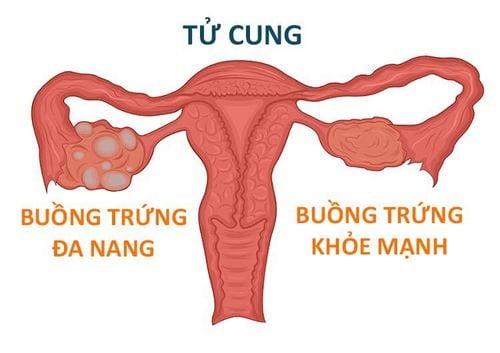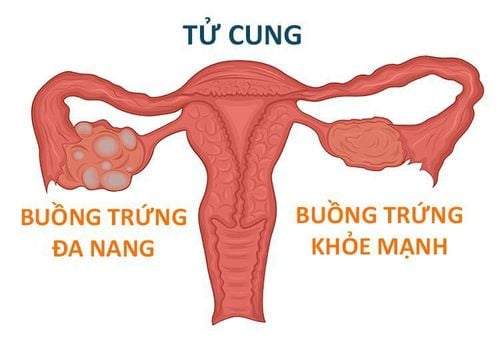This is an automatically translated article.
The article is professionally consulted with Master, Doctor Le Nhat Nguyen - Doctor of Obstetrics and Gynecology - Department of Obstetrics and Gynecology - Vinmec Danang International General Hospital.Polycystic ovary syndrome is a dangerous disease that causes infertility and infertility in women. In addition, polycystic ovary also increases the risk of diseases such as diabetes, high blood pressure ...
Polycystic ovary pregnancy is not a worry of many women when suffering from this disease. Polycystic ovary not only affects a woman's ability to become a mother but also endangers the patient's health because of the risk of diabetes, high blood pressure...
1. Effects of Polycystic Ovarian Syndrome on Menstrual Cycle
Polycystic ovary syndrome disrupts the ovulation cycle in women, so it also affects the menstrual cycle, causing patients to have menorrhagia, amenorrhea or amenorrhea. When the menstrual cycle is irregular, ovulation disorders will interfere with conception. If this condition persists, it will lead to infertility, even infertility.2. Polycystic ovary is the cause of infertility
Polycystic ovary syndrome is an endocrine disorder that is one of the main causes of infertility due to a lack of ovulation or disordered ovulation. When too much testosterone is produced in the ovaries, it slows down the development of eggs or stops developing when they are still immature. Women with PCOS may have fewer and fewer menstrual periods, irregular periods, or no monthly ovulation. Ultrasound of the ovaries showed many small cysts (from 6 to 10 cysts about 10mm in size). Because the follicle does not develop, the egg cannot mature and be released. However, not all women with PCOS are infertile. If the disease is not detected early, it will be one of the causes leading to infertility and infertility.
3. The relationship between polycystic ovaries and type 2 diabetes
Women with PCOS will experience insulin resistance, which causes high blood glucose levels, putting them at risk for type 2 diabetes and prediabetes. This disease is also very common in women who are overweight or obese, but can still occur in women of normal weight.4. Polycystic Ovary and Hypertension
Due to insulin resistance, it leads to increased cholesterol, high blood pressure and atherosclerosis, which in turn increases the risk of heart attack and stroke.Polycystic ovary syndrome can increase the risk of heart disease even for thin women.

5. Polycystic ovary increases the risk of endometrial cancer
In women with polycystic ovary syndrome, endocrine disorders lead to high levels of estrogen in the body. Estrogen is responsible for thickening the endometrium in preparation for the arrival of a fertilized egg. When not conceived, the lining will shed and that is a common menstrual phenomenon in women. However, when the menstrual cycle is disturbed or amenorrhea, the lining of the uterus will keep thickening and not shed due to the influence of high estrogen levels in the body, thereby increasing the risk of endometrial cancer. uterus.Thus, besides infertility, women with PCOS have a higher risk of endometrial cancer than women without the disease. In addition, women who are both overweight and have polycystic ovaries are also more likely to develop endometrial cancer.
6. Polycystic ovaries and obesity
Weight plays a very important role in promoting the symptoms of PCOS to manifest clinically. Some studies suggest that obesity also plays a role in the pathogenesis of polycystic ovary syndrome. 3Women with polycystic ovary syndrome will have an excess of the hormone insulin compared to the body's needs, thus having trouble with digestion and food metabolism problems. They may be more prone to obesity even if they don't eat as much.
To determine obesity status is based on BMI or waist / hip ratio. Statistics show that up to 30-50% of women with PCOS are obese, ie with a BMI >25. Therefore, weight control, or weight loss, can help improve PCOS.
When seeing abnormal signs such as menstrual disorders, high blood pressure, women should carefully monitor and visit a doctor to promptly detect disease and treat early polycystic ovary syndrome.
Please dial HOTLINE for more information or register for an appointment HERE. Download MyVinmec app to make appointments faster and to manage your bookings easily.














